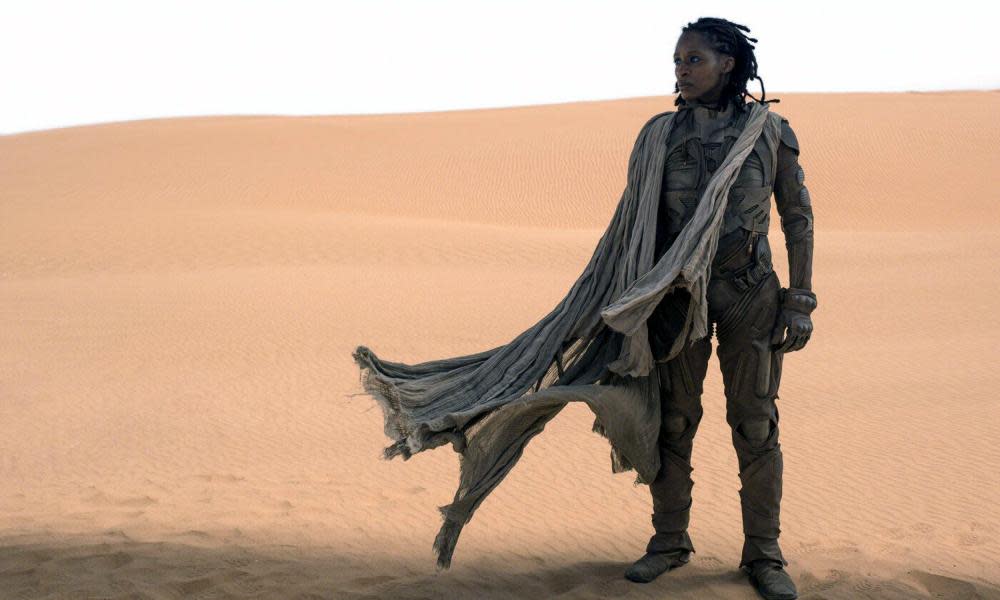Will Denis Villeneuve’s Dune finally succeed where others failed?

What kind of fool of a film-maker would proceed with part one of a major fantasy epic without first establishing that the studio backing it will stump up the cash for part two? That was the position Ralph Bakshi found himself in when his divisive 1978 animated take on JRR Tolkien’s Lord of the Rings failed to wow critics, and it’s the one Denis Villeneuve finds himself in with regard to his forthcoming take on Frank Herbert’s space fantasy Dune, which arrives in cinemas and on the streaming service HBO on 22 October.
There is no doubt that the first big-screen take on this tale of interstellar rivalries since David Lynch’s 1984 misfire has hype in spades. Early trailers featuring Timothée Chalamet as the messianic Paul Atreides, as well as a stellar cast including Zendaya, Rebecca Ferguson, Oscar Isaac, Josh Brolin, Stellan Skarsgård, Charlotte Rampling and Javier Bardem, wowed sci-fi fans. But then, Villeneuve’s previous sci-fi spectacular, Bladerunner 2049, was similarly a fan favourite and earned rapturous reviews, yet ended up with a middling box-office take. All talk of a third movie swiftly evaporated.
Dune is the kind of sprawling, idiosyncratic tome that would once have been labelled unfilmable by Hollywood … before Peter Jackson managed to make a three-part, 11-hour-plus version of The Lord of the Rings, and Warner Bros adapted every novel in JK Rowling’s Harry Potter saga without combining key characters or leaving out major plotlines. These days, studios understand that if you are going to mess with a much-loved novel, you had better have a really good reason for doing so. With the advent of social media, it only takes a few hardcore acolytes to point out that the movie is not doing its source material justice, and heads are rolling into Mount Doom faster than you can say “Tom Bombadil”.
Lynch had originally planned a three-hour-plus film version to cover the novel’s epic sprawl, but was forced to cut it down to 137 minutes at the behest of backer Dino De Laurentiis and his producer daughter Raffaella. A longer version for TV that ran to 186 minutes and featured outtakes and concept art stills was eventually disowned by the distressed film-maker, who is said to have refused all overtures from the studio Universal to make a final “director’s cut”.
Prior to Lynch, the maverick Chilean-French director Alejandro Jodorowsky had made a failed attempt to film the novel in the mid-1970s. With a cast that was intended to feature Salvador Dalí, Orson Welles, David Carradine and Mick Jagger, as well as a mooted musical backdrop provided by Pink Floyd (after Tangerine Dream were discarded), artists HR Giger, Chris Foss and Jean Giraud for set and character design and Dan O’Bannon for special effects, it stands as one of the great unmade fantasy spectacles, and a testament to the manic energy of a classic, starry-eyed, celluloid overreacher. As detailed in Frank Pavich’s excellent 2013 documentary Jodorowsky’s Dune, the 70s version would have been not 120 or 180 minutes long but a staggering 14 hours in breadth and scope. Unfortunately, it doesn’t actually exist.
Villeneuve has described his mixed feelings towards the Lynch version, despite calling his predecessor “the master”. “When I saw Dune, I remember being excited, but his take … there are parts that I love and other elements that I am less comfortable with,” he laments. “I remember being half-satisfied. That’s why I was thinking to myself, ‘There’s still a movie that needs to be made about that book, just a different sensibility.’”
Lynch, meanwhile, has said he has no intention of seeing the Villeneuve take. “I have zero interest in Dune,” he told the Hollywood Reporter last year. “Because it was a heartache for me. It was a failure and I didn’t have final cut. I’ve told this story a billion times. It’s not the film I wanted to make. I like certain parts of it very much — but it was a total failure for me.”
Villeneuve will at least have no such issues regarding final cut for the first part of Dune. But he needs to prove that the second deserves to funded. And he has had to suffer the indignity of seeing his film go straight to a streaming service on the same date it opens in US cinemas. Fortunately for Villeneuve and his many fans, modern Hollywood is also less likely to skimp on special-effects budgets than De Laurentiis reportedly did in the 1980s. If trailers are anything to go by, the Canadian’s vision of the desert planet Arrakis looks just like the one in our dreams. The tone is dark and deliciously sombre, the cinematography splendid, the palatial scenes opulent, the sandworms colossal and ominous. Jason Momoa still seems to be playing Aquaman as House Atreides swordsmaster Duncan Idaho, but hey, you can’t have everything.
What kind of fool film-maker would proceed with part one of a major fantasy epic without first establishing that the studio backing it will stump up the cash for part two? One with the vision to bring this sumptuous, hypnagogic, tortuously tangled tale to life on the big screen, and finally do it properly.

 Yahoo Movies
Yahoo Movies 
